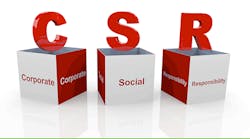"Integrity is doing the right thing, even when no one is watching."—C.S. Lewis
While the terms "sustainable" and "green" are still being used in corporate circles, a much more popular term these days is "responsible," especially in reference to corporate social responsibility efforts. Whatever buzzword is used, though, the premise is the same: Multi-national companies are expected to be good global citizens as they manage their supply chains throughout the world.
As we're learning, there are some very good reasons to be a good global citizen—reasons that come with dollar signs attached. According to a recent study conducted by the World Economic Forum (WEF) and Accenture, companies who are socially responsible can expect a "triple supply chain advantage" in the way of significant increases in revenue (between 5%-20%), along with a reduction in supply chain costs (9%-16%) and an increase in brand value (15%-30%).
So with results like that, it's not exactly a hard sell to convince senior managers that running their operations responsibly is a good thing to do.
Even so, there's something of a disconnect in management circles as to what being "responsible" really means.
"Companies are well equipped to understand the business impact of supply chain decisions on their own organizations," observes Wolfgang Lehmacher, head of supply chain and transport, mobility industries, with the WEF.
"However, to what extent do business leaders and supply chain managers understand the impact on the external world?"
The WEF/Accenture study attempts to answer that question. Rather than focusing on best practices, this study looks at "good practices" (in the sense of "doing good") that are being pursued by some well-known multi-nationals in the management of their supply chains. But the more I read through the study, the more I realized how much was being left unsaid, maybe to avoid painting these companies in an unflattering light.
For instance, the study notes how food & beverage producers are locally sourcing ingredients from farmers in developing countries, which helps increase the farmers' income and, by extension, their standard of living. All well and good.
However, the study does not point out that in other areas of the world, the extended supply chains of some of these same companies have been accused of doing things that are most assuredly not "good practices." I'm talking about things like worker exploitation, child labor, deforestation, sweatshops, wastewater dumping, human trafficking, distributing banned products overseas and other activities of the "not-so-good" variety. While recycling efforts and reductions in packaging materials—the focus of the study—contribute positively to environmental improvements, they hardly compensate for practices that threaten the livelihood of the local communities.
I was in El Salvador recently, and learned about the clean water crisis there, particularly in one farming community near the capital city. The water shortage is partly due to a severe drought that's crippling most of Central America, but it's also been greatly exacerbated by beverage companies that use industrial wells to access the huge quantities of water needed to manufacture their products. What these companies are doing is quite legal, to be sure, but for the farmers whose sole source of income (and sometimes, sole source of food) is the crops they raise, going without clean water is a sacrifice they shouldn't be asked to make.
While in El Salvador, I had the chance to work with a group of women in a small town who, by any economic measure we use here in the United States, would be considered as poor. And yet, their mission was to distribute food and clothing to the very poorest of the poor in their community.
These women were literally the only supply chain for people who otherwise had nothing, and I would suggest they come far closer to meeting the definition of "sustainability" than the multi-nationals who talk a good game when the cameras are on, but don't necessarily follow through when nobody's watching.
Maybe instead of talking about responsibility, we should focus on a concept that's much harder to quantify with metrics, but is absolutely required within each and every supply chain: integrity.





